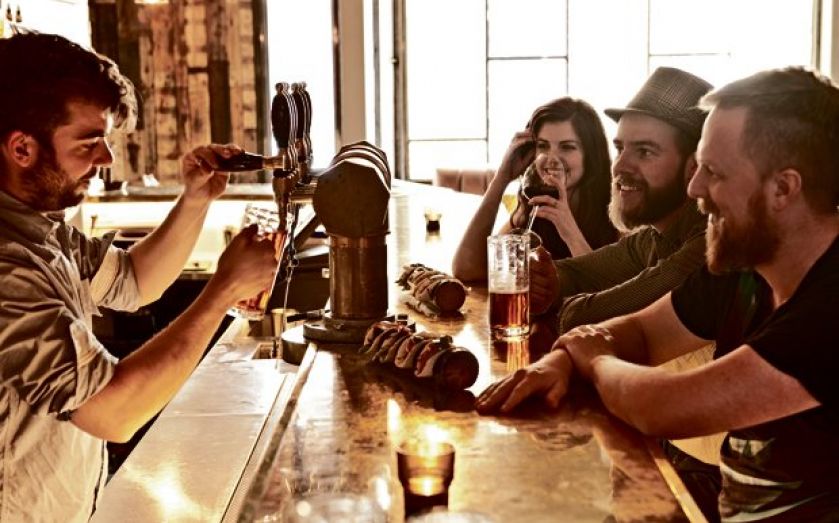AB InBev and SABMiller need to tap into craft beer trend

The long-awaited announcement that Anheuser-Busch InBev (AB InBev) was officially considering a takeover of rival SABMiller saw the companies’ share prices jump 19.89 per cent and 6.41 per cent respectively.
However, yesterday the hangover kicked in, and SABMiller’s shares closed down 0.25 per cent at 3,605p, having dropped as low as 3,593p.
The deal would create a mammoth global brewery worth about $275bn (£177bn).
Some analysts have questioned just how good a deal this would be. Spiros Malandrakis, senior alcoholic drinks analyst at Euromonitor International, told City A.M.: “Bigger is not necessarily better.”
Others have pointed out that the brewers aren’t taking consumer trends into account, and that cost-cutting alone is not a sustainable strategy.
When big brands do try to tap into the craft trend, for instance Heineken’s recent purchase of Lagunitas, there’s a backlash.
Malandrakis said: “As the craft movement solidifies its position as a disruptive force within the entire alcohol industry, corporate consolidation can perhaps provide some last drops of stock market intoxication, but will remain largely irrelevant to the scores of millennials seeking alternatives to big beer’s offerings.”
Ab InBev’s majority shareholder, Brazilian private equity group 3G, has a strong track record of making savings: it cut 7,000 jobs within 18 months of taking over Heinz in 2013.
As Barclays noted yesterday, there’s space for savings in areas where they overlap, and can share facilities. AB InBev and 3G may be able to scrape a total of $1.4bn savings from SABMiller, with their “ruthless cost control mantra”.
But given the fractured nature of the African market, several analysts have pointed out margins are already lower there and as AB InBev has no footing, there is less room to manoeuvre, undermining of one the main reasons for the deal.
Canaccord Genuity was more optimistic and factored in at least $2.5bn of savings on top of sales.
THE WORLDS OF SABMILLER & AB INBEV:
EUROPE
SABMiller and AB Inbev own some of Europe and the world’s, most recognisable beer brands, from Stella Artois and Becks to Peroni. They have a combined global market share of 30.1 per cent. Although SAB owns Fosters International, in Europe it is run by Dutch rival Heineken, which SAB failed to buy in 2014, and which controls 9.1 per cent of the global market, just behind SAB.
ASIA
Cass, in Korea, is one of InBev’s Asian offerings. SAB also has a market there, and owns a 49 per cent stake in CR Snow in China – the world’s single largest beer brand – along with China Resources Enterprises (CRE), a state run holding. It is possible that SAB would have to sell its Snow stake post-merger to satisfy Chinese regulators, which would probably be bought by CRE.
NORTH AMERICA
Both SAB, which jointly owns the Coors brands, and InBev, which owns Bud Light, have suffered from a slowdown in American markets. Given their overlap, it is almost certain US regulators would want SAB to sell its stake in Miller Coors, back to Molson Coors, analysts expect. Eddy Hargreaves, at Canaccord Genuity, estimates the disposal could be worth $9bn (£5.8bn).
AFRICA
SAB is well established here, from Eagle in Uganda to Club in Ghana – while South African-based Castle is sold everywhere. But InBev has almost nothing. Complementary presence across emerging markets is one of the main motivations for the deal. SAB joined forces with Coca-Cola last November to create a new bottling company, Coca-Cola Beverages Africa, in which it holds a 57 per cent stake.
SOUTH AMERICA
Both rivals have a multitude of South American brands, such as Peruvian Cusquena, which is imported here, and InBev’s original brand, Brahma in Brazil, although there’s little overlap. InBev also have a distribution deal with Pepsi in Brazil. Analysts are divided over whether the control of bottling for rivals Coca-Cola and Pepsi, albeit on different continents, will force InBev to end the relationship or not.